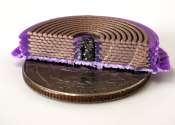Making a 'sandwich' out of magnets and topological insulators shows potential for lossless electronics
A Monash University-led research team has discovered that a structure comprising an ultra-thin topological insulator sandwiched between two 2D ferromagnetic insulators becomes a large-bandgap quantum anomalous Hall insulator.
Apr 4, 2022
0
39









